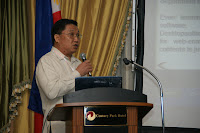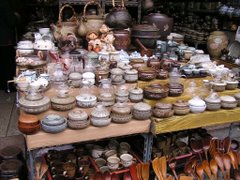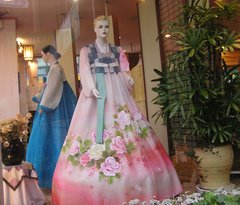For the 3rd consecutive school year, the Information Technology Department placed 1st among the departments of De La Salle University in Manila in terms of ITEO teaching evaluation.
Congratulations to the IT Department to this Grand Slam!!! Congratulations too, to Mr. Oliver Malabanan, department head.
I think our chairperson, Mr. Oliver Malabanan, should call for a big celebration! Imagine we defeated the different departments in the College of Education. It's not a contest I know. But it just shows that we have effective teaching strategies!
I'm proud to be part of this department! Cheers!!! :-)
___________________________
I would also want to congratulate a very respectable and very dedicated professor and university fellow in our college, Dr. Raymund Sison, likewise a National Scientist, as a recipient of the prestigious Metrobank Foundation Outstanding Teacher Award this 2010. I salute you Dr. Sison! Cheers!!! :-)
Saturday, July 31, 2010
For the Filipino Teacher
I spent a brief time in Camelot Hotel yesterday afternoon in Quezon City giving a lecture on Communities of Practice (COPs). I was moved by the simplicity of the delegates and the warm hospitality of the professors from the Polytechnic University of the Philippines. And one of the questions thrown to me really struck me (not exactly to this statement but to this effect)-- Given my exposure on various uses of technology in education, what is the topmost problem we have locally and how can this be addressed?
And so I answered that I still consider economic problem as the primary issue. It was concurred by Dr. Lorenzo of PUP. But I guess economic issue should not hurdle us from building a COP for that matter. I also would like to dedicate extra time starting this week to post something to support the idea of ICT use in teaching--for my dedicated teaching colleagues in the country.
I will share different creative ways of using ICT in teaching as I have done them.
And so I answered that I still consider economic problem as the primary issue. It was concurred by Dr. Lorenzo of PUP. But I guess economic issue should not hurdle us from building a COP for that matter. I also would like to dedicate extra time starting this week to post something to support the idea of ICT use in teaching--for my dedicated teaching colleagues in the country.
I will share different creative ways of using ICT in teaching as I have done them.
The 3rd Annual Conference The Philippine Association for Business Educators, (PAFBE) Inc
My supervisor was one of the speakers in the 3rd Annual Conference The Philippine Association for Business Educators, (PAFBE) Inc held last July 30 and 31. Unfortunately, he had a sudden important engagement and I agreed to pitch for him. Dr. Lorenzo of PUP, the convenors, the officers, the teachers and delegates of PAFBE gave a warm response to my presentation.
Here are the excerpts of my presentation---
"Even with late notice, I tried my best to prepare something that you will bring home as part of a solution instead of posting many issues and concerns that may drag your weekend of pondering whether there is an answer to the never ending question of how do we implement technology.
For this afternoon, I am bringing to you a not very young idea. This is an idea typically used in business organizations in the light of sustaining the use and application of technology. And I will put this in the context of education. The title of my presentation is Creating Communities of Practice (COPs) through Practical ICT and Web 2.0."
"Context is putting and using technology on the right perspective of the subject matter. And the knowledge and skills of the business educators or even the teachers will be very important in this situation. Context is not using technology as suggested in the software tutorial. Context is making the students realize to use or apply the right technology as prescribed by the situation, the problem to be solved or the project to be done. And this is one of the creative challenges among teachers".
I hope I was able to inspire them of the idea of Communities of Practice. I have shared with them the concept, the characteristics as posted by Etienne Wenger, the proponent of the COP and I gave my own examples situating it to the local setting. I also hope that introducing Web 2.0 gave informative insights of various alternatives on how to use them in teaching. Some of these are--
Web 2.0 Teaching & Learning Tools
These are some of the common examples. There are still many tools and solutions.
Youtube – to showcase student experiences; to reuse good howto videos
An anthropological introduction to Youtube by Michael Wesch -- http://www.grokdotcom.com/2008/08/04/1462/
An ethical behavior and social responsibility video by Louie Sioco, James Sy & Johann Go http://www.youtube.com/watch?v=-EJW89mUagA
Blogs – to extend class discussions; to extend student interactions
http://whymanagetech.blogspot.com/2007/05/notes-on-external-business-environment.html
Forums, e-groups & social network sites – to post announcements; to share files; & to encourage healthy dialogues and responsible online behavior among students
Google maps – to visually enhance geography concepts
Online News – to know what is happening in the world
Wikis – to encourage collaborative writing and research
Photos – to encourage artistic expression and develop digital art skills
http://mobilemartha.multiply.com/photos/album/12/EM-TECH_Technology_Exhibit
Skype & yahoo messenger – to facilitate online discussions
Second life – to enhance remote role-playing activities
I also mentioned to them that mobile phones and music players are useful ICT tools--
o To capture proof of data gathering (e.g. interview)
o To capture procedures of the experiments
o To capture board notes
o To listen about the lessons or to produce outputs through podcasts
Podcasts are audio files in MP3 format that is used to hold various content like discussions, interviews, opinions or meetings.
Of course, PRACTICE makes PERFECT or EFFECTIVE OUTCOMES.
Very important hindsights to bring home---
1. Don’t get immersed in the technology, context is more important!
2. Make it a rule of thumb to apply your teaching techniques and styles.
3. Discuss your methods openly to your colleagues. It encourages “shared practice”.
4. Encourage student participation and collaboration.
5. Institutionalize “best practices” and build a “Community of Practice”!
Here are the excerpts of my presentation---
"Even with late notice, I tried my best to prepare something that you will bring home as part of a solution instead of posting many issues and concerns that may drag your weekend of pondering whether there is an answer to the never ending question of how do we implement technology.
For this afternoon, I am bringing to you a not very young idea. This is an idea typically used in business organizations in the light of sustaining the use and application of technology. And I will put this in the context of education. The title of my presentation is Creating Communities of Practice (COPs) through Practical ICT and Web 2.0."
"Context is putting and using technology on the right perspective of the subject matter. And the knowledge and skills of the business educators or even the teachers will be very important in this situation. Context is not using technology as suggested in the software tutorial. Context is making the students realize to use or apply the right technology as prescribed by the situation, the problem to be solved or the project to be done. And this is one of the creative challenges among teachers".
I hope I was able to inspire them of the idea of Communities of Practice. I have shared with them the concept, the characteristics as posted by Etienne Wenger, the proponent of the COP and I gave my own examples situating it to the local setting. I also hope that introducing Web 2.0 gave informative insights of various alternatives on how to use them in teaching. Some of these are--
Web 2.0 Teaching & Learning Tools
These are some of the common examples. There are still many tools and solutions.
Youtube – to showcase student experiences; to reuse good howto videos
An anthropological introduction to Youtube by Michael Wesch -- http://www.grokdotcom.com/2008/08/04/1462/
An ethical behavior and social responsibility video by Louie Sioco, James Sy & Johann Go http://www.youtube.com/watch?v=-EJW89mUagA
Blogs – to extend class discussions; to extend student interactions
http://whymanagetech.blogspot.com/2007/05/notes-on-external-business-environment.html
Forums, e-groups & social network sites – to post announcements; to share files; & to encourage healthy dialogues and responsible online behavior among students
Google maps – to visually enhance geography concepts
Online News – to know what is happening in the world
Wikis – to encourage collaborative writing and research
Photos – to encourage artistic expression and develop digital art skills
http://mobilemartha.multiply.com/photos/album/12/EM-TECH_Technology_Exhibit
Skype & yahoo messenger – to facilitate online discussions
Second life – to enhance remote role-playing activities
I also mentioned to them that mobile phones and music players are useful ICT tools--
o To capture proof of data gathering (e.g. interview)
o To capture procedures of the experiments
o To capture board notes
o To listen about the lessons or to produce outputs through podcasts
Podcasts are audio files in MP3 format that is used to hold various content like discussions, interviews, opinions or meetings.
Of course, PRACTICE makes PERFECT or EFFECTIVE OUTCOMES.
Very important hindsights to bring home---
1. Don’t get immersed in the technology, context is more important!
2. Make it a rule of thumb to apply your teaching techniques and styles.
3. Discuss your methods openly to your colleagues. It encourages “shared practice”.
4. Encourage student participation and collaboration.
5. Institutionalize “best practices” and build a “Community of Practice”!
Wednesday, July 28, 2010
To confer or not to confer in a conference




There are many reasons why an academic would want to participate in a conference. It could be to be able to validate her ideas and get insights on others' perception. It is also a way for her to become abreast of the new developments in her field, realize her ideas may not be new but still useful. It is also possible to realize that things that motivate her to do research may be the same motivations other academics have.
In a conference, it is either she will engage in a constructive dialogue or not. It is also possible that she will just be on that stage of just receiving, filtering and processing all the new things she is hearing and learning.
It is also a way to see the world, travel and learn about other cultures and try out new dishes. This is one of the attractive side of participating in a conference. She gets to be out of the classroom, on an official capacity, move in autonomy, manage schedules and accommodations, learn phrases of another language and interact with coercive taxi drivers.
But the other important thing that some conference attendees tend to forget or overlook is the opportunity of meaningful connections, having new academic friends (maybe real friends in the long run) and a possibility of continuous exchange of new ideas and experiences. These meaningful connections are not completely addressed by online interactions or even listening to a video or podcast of a very good social anthropologist. Nothing can replace a beautiful encounter in a worthwhile conference or symposium.
And I am glad I took such bold step of engaging in meaningful connections. I have a few but very good academic friends. And we still keep in touch.
*The first four photos were taken during the ICICTE July 2009 Conference in Corfu, Greece. Some of the academic friends I met-- Maria Spante, Liming Zhang, Karen Baskett (not in the photo), Uthman Alturki, Hind Alfadda, Keith Kirkwood and Svetlana Osipova.
Maria Spante and Keith Kirkwood were both gracious to come to Manila last March 2010 to speak in our conference. (The last photo was taken on the first day of the Manila conference.)
TOUCHPOINT 2010 Invited Guests and Friends
Keynote Speaker:
Maria Spante, Ph.D.
Chalmers University of Technology
Department of Technology Management and Economics
MARIA SPANTE holds a PhD position at Chalmers University of Technology, Department of Technology Management and Economics, Division of Technology and Society. Dr. Spante is a prolific researcher. Her current research expertise focuses on social interaction in technical systems, technical systems and human relations, and learning and interactive media.
Plenary Speakers:
Emmanuel Lallana, Phd.
Chief Executive
ideacorp
EMMANUEL LALLANA is the Chief Executive of ideacorp, an independent, non-profit organization focused on the use (ICT) in governance and education, in business and the economy and in the transforming society. Currently, Dr. Lallana is the project leader of Pan Asia Network on Democratic eGovernance (PANeGOV), a nine-country research initiative on the use of ICT in good governance and citizen empowerment in Asia.
Keith Kirkwood
School of Learning Support
Victoria University, Melbourne, Australia
KEITH KIRKWOOD is a Lecturer in the School of Learning Support at Victoria University in Melbourne, Australia, where he is managing the design and development of the SNAP Platform, and has helped articulate the School’s Students Supporting Students Learning strategy. He is working towards the integration of learning and information skills in the development of a holistic and integrated participatory learning platform.

Maria Spante, Ph.D.
Chalmers University of Technology
Department of Technology Management and Economics
MARIA SPANTE holds a PhD position at Chalmers University of Technology, Department of Technology Management and Economics, Division of Technology and Society. Dr. Spante is a prolific researcher. Her current research expertise focuses on social interaction in technical systems, technical systems and human relations, and learning and interactive media.
Plenary Speakers:
Emmanuel Lallana, Phd.
Chief Executive
ideacorp
EMMANUEL LALLANA is the Chief Executive of ideacorp, an independent, non-profit organization focused on the use (ICT) in governance and education, in business and the economy and in the transforming society. Currently, Dr. Lallana is the project leader of Pan Asia Network on Democratic eGovernance (PANeGOV), a nine-country research initiative on the use of ICT in good governance and citizen empowerment in Asia.
Keith Kirkwood
School of Learning Support
Victoria University, Melbourne, Australia
KEITH KIRKWOOD is a Lecturer in the School of Learning Support at Victoria University in Melbourne, Australia, where he is managing the design and development of the SNAP Platform, and has helped articulate the School’s Students Supporting Students Learning strategy. He is working towards the integration of learning and information skills in the development of a holistic and integrated participatory learning platform.

And there's Touchpoint 2010

These are my thoughts and words for Touchpoint 2010--
TOUCHPOINT is a new word and concept coined to denote an engaging interaction, a learning epiphany, a fresh connection. It can still be defined further. And as we realize the idea of Touchpoint, the more it becomes meaningful.
When Touchpoint 2010 International Conference was conceived, it has the following goals—to encourage intellectual engagement among Filipino academic peers, to open and create opportunities for linkages and connections, and to support local teachers and educators on their quest for better teaching and learning practices with the use of ICT. The presence and participation of foreign academic peers have enhanced the quality of didactic exchange in this historical event.
________________________________
Here's the conference programme.
Conference Programme
March 4, 2010
Thursday
7.30-8.30am Registration
8.30-8.40am National Anthem
Invocation by Prof. Estefanie Ulit
8.40-9.00am Welcome Remarks
Br. Armin A. Luistro FSC, President and Chancellor, De La Salle University
9.00-9.15am The Touchpoint 2010 Rationale
Prof. Oliver Malabanan, Touchpoint 2010 Program Chair
9.15-9.20am Introduction to First Plenary Speaker
Prof. Oliver Malabanan, Touchpoint 2010 Program Chair
9.15-10.00am First Plenary Talk and Keynote Speech
“Interactivity, Visualization and Learning: Challenges and Possibilities”
Dr. Maria Spante (Invited)
Chalmers University, Gothenburg, Sweden
10.00-10.20am Questions/Reactions to Plenary Talk
10.20-10.40am Coffee Break
10.40-10.50am Introduction to Second Plenary Speaker
Prof. Sherwin Ona, CITe4D Chair, DLSU
10.50-11.25am Second Plenary Talk
Dr. Emmanuel Llana (Invited)
President, Idea Corp
11.25-11.40am Questions/Reactions to Plenary Talk
11.40-12.00nn Cultural Presentation by the La Salle Dance Company
12nn-1.00pm Lunch
1.00-1.10pm Introduction to the Third Plenary Speaker
Prof. Ma. Victoria Pineda, Touchpoint 2010 Vice Program Chair
1.10-1.50pm Third Plenary Talk
“Participating To Learn, Learning To Participate”
Prof. Keith Kirkwood (Invited)
Victoria University, Melbourne, Australia
1.50-2.10pm Questions/Reactions to Plenary Talk
2.10-2.30pm Coffee Break
2.30-5.00pm Parallel Sessions
March 5, 2010
Friday
9.00-9.10am Introduction to the Fourth Plenary Speaker
Dr. Zelinna Cynthia Pablo-dela Cruz
Information Technology Department, De La Salle University
9.10-9.45am Fourth Plenary Talk
Prof. Charibeth Cheng
Director, Advanced Research Institute for Computing, De La Salle University
9.45-10.00am Questions/Reactions to Plenary Talk
10.00-10.20am Coffee Break
10.30-12.00nn Parallel Sessions
12.00-1.00pm Lunch
1.00-4.30pm Parallel Sessions
4.00-4.30pm Coffee Break
4.30-4.40pm Introduction to the Fifth Plenary Speaker
Prof. Estefanie Ulit, De La Salle University
4.40-5.20pm Fifth Plenary Talk and Closing of the Conference
Dr. Jose Lloyd Espiritu, Touchpoint 2010 Editor
De La Salle University, Manila
5.20-5.30pm Questions/Reactions to Plenary Talk
6.30-7.00pm Pick-up time for the Social Dinner
7.00-8.30pm Social Dinner with all the Presenters & Guests
with Intermission of the DLSU Cultural Arts Office
Social Dinner is sponsored by iSolutions
Prof. Renato Jose Molano
Master of Ceremonies
Updates in 2010
It's been awhile since I updated these pages. September 2009-March 2010 were very busy months for me. First there was the devastating Typhoon Ondoy. It gave me the chance do urgent and dispersed volunteer work because the people, the families that need support were just too many.
Next, I was also part of the DLSU-CCS Technical Team that evaluated and monitored the Automated Election Systems in the Philippines; engaged in training roadshows, and served as one of the resource persons on the side of DLSU. This AES study was initiated by the Lasallian Justice and Peace Commission and by the College of Computer Studies of De La Salle University.
In parallel with the AES activities, I have been doing the preparations for the Touchpoint 2010 International Conference on Technology in Education as Conference Secretariat.
I am no superhero. But I guess the energy and the momentum keep me on my toes to just keep going. I am blessed to have very supportive supervisors like Mr. Oliver Malabanan, Mr. Sherwin Ona, Ms. Chari Cheng and Dr. Rachel Roxas. Along the way I was also blessed (again) with reliable support staff like Ms. Hazel Ventura and Mr. Roger Damo. And I had good working relationship with Mr. Rene Molano, Ms. Stef Ulit, Mr. Glenn Sipin, Ms. Christine Tavera and of course, Ms. Marivic Tangkeko as we accomplish our goals together.
And for school year 2010, several of my projects are focused on community-based disaster risk reduction.
Next, I was also part of the DLSU-CCS Technical Team that evaluated and monitored the Automated Election Systems in the Philippines; engaged in training roadshows, and served as one of the resource persons on the side of DLSU. This AES study was initiated by the Lasallian Justice and Peace Commission and by the College of Computer Studies of De La Salle University.
In parallel with the AES activities, I have been doing the preparations for the Touchpoint 2010 International Conference on Technology in Education as Conference Secretariat.
I am no superhero. But I guess the energy and the momentum keep me on my toes to just keep going. I am blessed to have very supportive supervisors like Mr. Oliver Malabanan, Mr. Sherwin Ona, Ms. Chari Cheng and Dr. Rachel Roxas. Along the way I was also blessed (again) with reliable support staff like Ms. Hazel Ventura and Mr. Roger Damo. And I had good working relationship with Mr. Rene Molano, Ms. Stef Ulit, Mr. Glenn Sipin, Ms. Christine Tavera and of course, Ms. Marivic Tangkeko as we accomplish our goals together.
And for school year 2010, several of my projects are focused on community-based disaster risk reduction.
Subscribe to:
Posts (Atom)

































